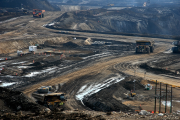Tough on crime. Tough on people smugglers. Tough on prison pensions. The list of things the federal government is getting tough on continues to grow-with a glaring exception. If the intention is to project a "getting tough" image, we need to be consistent and get tough on polluters.
Specifically, why is the federal government standing weakly on the sidelines while the oil sands industry makes a mockery of its national commitments to reduce global warming pollution?
We released a new report last week showing several areas in which federal laws need to be better enforced to limit the worst impacts of oilsands activities. The government itself recently acknowledged that it needs to get a better handle on water pollution monitoring in the Athabasca River, which is a first step to better enforcing the federal Fisheries Act.
But, it is in the area of carbon pollution that the oilsands industry so clearly failing to get with the program. Canada's current targets to reduce global warming fall well short of what science says is needed-but even under those weak goals, the government has said it will expect the oilsands to do its part, along with other industries in the country, to help Canada meet an increasingly tight budget for greenhouse gas emissions.
The problem is that's not at all what the oilsands industry has planned.
Our report shows that by 2020 the oilsands industry is projected to spend three and a half times its proportional share of Canada's total budget for carbon emissions. By 2050, it will blow its carbon budget by a whopping 40 times-or more. These numbers are very generous, because they assume that carbon capture and storage is fully implemented in the industry and is operating at its most optimistic projections.
The implication is that if Canada is going to hit its global warming targets-and Environment Minister Jim Prentice confirmed last week the intention to do so-then other sectors of the economy and society would have to make substantially bigger cuts to their own carbon emissions to make up for the oil industry's over-spending of its carbon budget. That kind of unfairness is hardly an outcome that a tough manager of our federation could condone.
We join an unlikely and growing chorus of voices saying that the federal government must step up on the energy file. Both the Canadian Chamber of Commerce and the Council of Canadians have called for a national energy strategy. We imagine their visions would differ somewhat, but the fact remains that people across the political spectrum are seeing a vacuum at the national level. A good indicator of this is the growing number of think tanks now hosting conferences on this issue. We are apparently ready to talk tough and at length about what needs to be done-but we are missing action.
What is stopping the federal government from actually moving ahead to get tough on pollution? It's not the opposition parties, since each of them has called for the government to do more. It's not the voters, since there is a hunger across the country for Canada to regain lost ground on being a green leader internationally. It's not even the Americans, our main energy customers, with their ambassador on record saying more needs to be done to improve management in the oilsands.
The reluctance likely comes down to being unnerved by the saber rattling that the Alberta government resorts to each time the prospect of federal action arises. The ghosts of the long dead National Energy Program are trotted out every time someone tries to remind the Alberta government that while it may have jurisdiction over natural resources, it doesn't have sole jurisdiction or accountability for addressing all of the social, environmental and economic issues arising from their development. It would seem enough federal politicians are still spooked by this ancient bogeyman.
Yet, we are now in a dramatically different place than we were 30 years ago. The reality of potential catastrophic climate change is staring us starkly in the face, and a new industrial revolution is unfolding around the world, centered on de-carbonizing our economy. Canada's allies and competitors understand this new reality and are acting accordingly. Here at home, however, we are stuck, endlessly debating the oilsands and thereby missing the opportunities to catch up with those who are moving aggressively towards a clean energy economy.
These challenges are not easy, and it will indeed take tough decisions to solve them. When we look around, however, we see that most people are ready for these decisions and want the federal government to get on with it. It's time that Ottawa better enforced the environmental protection laws we have on the oilsands, and charted a better pathway for Canada in a new world.






